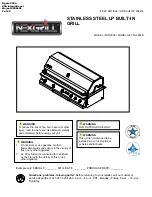
CARE & USE/INSTALLATION
|
9
BUILT-IN INSTALLATIONS
The Lynx Built-In Grill is designed for easy installation into
masonry enclosures.
NOTE: Lynx built-in grills are intended either for
installation in a built-in enclosure constructed of
non-combustible materials or for an installation in a built
in enclosure constructed of combustible material when
installed with a Lynx insulating jacket (LIJ).
For non-combustible applications, the grill drops into the
opening shown in the cutout detail drawing (See INDEX:
“Gas Requirements”) and hangs from its counter-top trim. A
deck is not required to support it from the bottom.
When using the insulated jacket in a combustible enclosure,
the jacket must be supported from the bottom by a ledge
on each side or a full deck beneath the jacket.
(See INDEX: “Gas Requirements”) Pay special attention to
the provisions shown for gas line hook-up.
The enclosure should have ventilation holes to prevent gas
build-up in the event of a leak. The deck ledges and coun-
ter should be flat and level. (refer to ANSI Z21.58 Standard
for Outdoor Cooking Gas Appliances, Section 1.7 Enclo-
sures For Self Contained LP-Gas Supply Systems)
This grill requires that a 120 volt, 60 hertz, 15 amp GFI certi-
fied outlet be installed by a qualified electrician.
Never locate the transformer or grill gas line behind the
grill inside the insulated jacket.
CLEARANCE TO COMBUSTIBLE MATERIALS
Minimum clearance from the sides and back of the grill to
adjacent combustible construction below the counter top
surface is 12” from the sides and 6 1/4” from the back of
the hood.
Dégagement minimal entre les parois latérales et l’arrière de l’appariel
et la construction combustible au-dessous du panneau supérieur de
l’appareil (30 cm à partir des parois latérales et 15.9 cm à partir de
l’arrière de la hotte).
Minimum clearance from sides and back of grill to adjacent
combustible construction extending above the counter top
surface is 12” from the sides and 6 1/4” from the back.
Dégagement horizontal minimal entre les parois latérales et l’arrière
de l’appariel et la construction verticale combustible au-dessus de
l’appareil (30 cm à partir des parois latérales et 15.9 cm à partir de
l’arrière).
Do not use this appliance under unprotected overhead
combustible surfaces.
N’utilisez pas cet appareil sous des surfaces inflammables non
protégées.
A minimum of 6” of clearance is needed on the left side of
the grill above the counter top for the rotisserie motor and
spit rod.
If the grill is to be placed into a combustible enclosure, an
approved insulated jacket is necessary and is available only
from your Lynx dealer. Lynx insulated jackets have been
designed and tested specifically for your Grill.
REAR HOOD CLEARANCE
A 3 inch clearance is required behind the grill to allow the
front hood to open.
The grill exhausts combustion products and cooking
greases to the back. Never locate the grill where this
exhaust will be difficult to clean.
OVERHEAD PROTECTION AND EXHAUST REMOVAL
If installed under any combustible contruction the
cooking area over the grill must be covered with an exhaust
hood. The hood must provide 3-6 inches of overhang on all
exposed sides. The exhaust hood shall provide no less than
1,200 CFM for proper exhaust ventilation. The hood must
be approved for outdoor installation and provided with a
dedicated GFCI protected branch circuit.
BEFORE YOU START
...
continued
Vent Hood
Overhead Construction
R
e
a
r
W
a
l
l
3” overhang on left and right side of grill
36” Minimum
6’ Minimum to
non-combustible
6 1/4” Clearance from the
grill back to above
counter combustibles
3” Minimum
hood clearance
12” clearance to combustibles from
surface level right/left/below
Combustible overhead
construction requires a
vent hood
Non-combustible overhead
construction a vent hood is
highly recommended
6 1/4” Minimum
clearance to
combustibles
33526 2018 Lynx All Trident Care and Use Manual Rev.E.indd 9
2/27/2018 9:31:30 AM










































